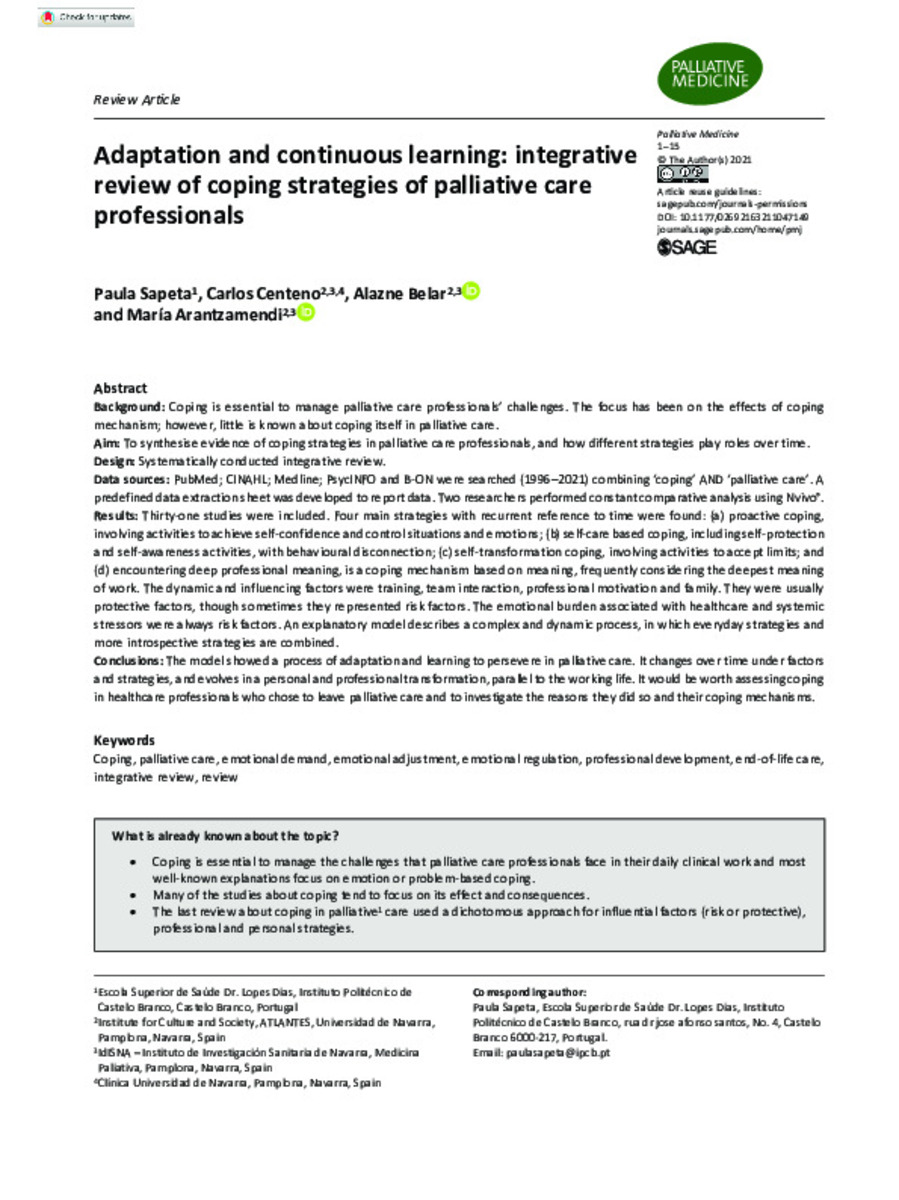Full metadata record
| DC Field | Value | Language |
|---|---|---|
| dc.creator | Sapeta, P. (Paula) | - |
| dc.creator | Centeno, C. (Carlos) | - |
| dc.creator | Belar, A. (Alazne) | - |
| dc.creator | Arantzamendi-Solabarrieta, M. (María) | - |
| dc.date.accessioned | 2021-10-18T09:31:17Z | - |
| dc.date.available | 2021-10-18T09:31:17Z | - |
| dc.date.issued | 2021 | - |
| dc.identifier.citation | Sapeta, P., Centeno, C., Belar, A., & Arantzamendi, M. (2021). Adaptation and continuous learning: integrative review of coping strategies of palliative care professionals. Palliative Medicine, 2692163211047149. | es_ES |
| dc.identifier.issn | 0269-2163 | - |
| dc.identifier.uri | https://hdl.handle.net/10171/62167 | - |
| dc.description.abstract | Background: Coping is essential to manage palliative care professionals’ challenges. The focus has been on the effects of coping mechanism; however, little is known about coping itself in palliative care. Aim: To synthesise evidence of coping strategies in palliative care professionals, and how different strategies play roles over time. Results: Thirty-one studies were included. Four main strategies with recurrent reference to time were found: (a) proactive coping, involving activities to achieve self-confidence and control situations and emotions; (b) self-care based coping, including self-protection and self-awareness activities, with behavioural disconnection; (c) self-transformation coping, involving activities to accept limits; and (d) encountering deep professional meaning, is a coping mechanism based on meaning, frequently considering the deepest meaning of work. The dynamic and influencing factors were training, team interaction, professional motivation and family. They were usually protective factors, though sometimes they represented risk factors. The emotional burden associated with healthcare and systemic stressors were always risk factors. An explanatory model describes a complex and dynamic process, in which everyday strategies and more introspective strategies are combined. Conclusions: The model showed a process of adaptation and learning to persevere in palliative care. It changes over time under factors and strategies, and evolves in a personal and professional transformation, parallel to the working life. It would be worth assessing coping in healthcare professionals who chose to leave palliative care and to investigate the reasons they did so and their coping mechanisms. | es_ES |
| dc.language.iso | eng | es_ES |
| dc.publisher | SAGE Publications | es_ES |
| dc.rights | info:eu-repo/semantics/openAccess | es_ES |
| dc.subject | Coping | es_ES |
| dc.subject | Palliative care | es_ES |
| dc.subject | Emotional demand | es_ES |
| dc.subject | Emotional adjustment | es_ES |
| dc.subject | Emotional regulation | es_ES |
| dc.subject | Professional development | es_ES |
| dc.subject | End-of-life care | es_ES |
| dc.subject | Integrative review | es_ES |
| dc.title | Adaptation and continuous learning: integrative review of coping strategies of palliative care professionals | es_ES |
| dc.type | info:eu-repo/semantics/article | es_ES |
| dc.relation.publisherversion | https://doi.org/10.1177/02692163211047149 | es_ES |
| dc.description.note | Attribution-NonCommercial 4.0 International (CC BY-NC 4.0) | es_ES |
Files in This Item:
Statistics and impact
Items in Dadun are protected by copyright, with all rights reserved, unless otherwise indicated.






